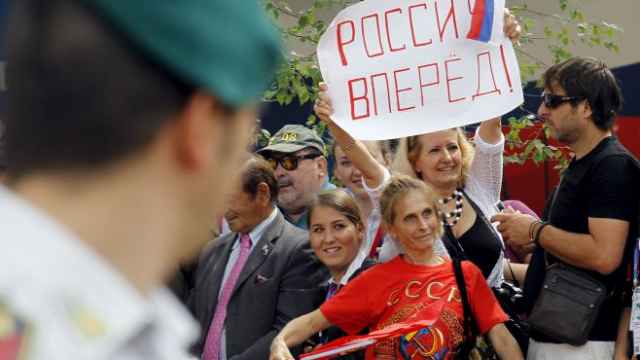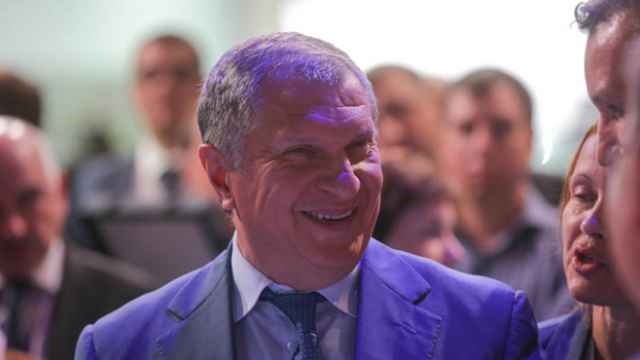The continuing deterioration of the economic situation, falling incomes and rising prices are increasingly affecting Russians. A new survey released by state-run pollster VTsIOM reveals recent changes in consumer behavior. The number of respondents in July who have switched to buying less expensive foods and products has risen sharply from 38 percent in January 2015 to 53 percent in July, and the number of those foregoing needed purchases has climbed from 39 percent to 52 percent over the same period.
However, the continued devaluation of the ruble coupled with the drop in oil prices has not led to a serious backlash among the people. According to VTsIOM, only 10 percent of Russians hold their savings in foreign currency.
And according to the Public Opinion Foundation, of the 35 percent of Russians who have any savings at all, 92 percent keep them in rubles. The Russian people prefer using rubles, whether or not they have savings.
And although last December's devaluation of the ruble and the subsequent worsening of the situation drove home a basic lesson in economics, most Russians still react not to the price of oil or the ruble exchange rate, but to the prices in stores and the cost of basic utilities. They act accordingly, by reducing consumption and stocking up on reserves of inexpensive staple foods. In other words, they switch into "survival mode."
After all, how can ordinary citizens influence the price of oil or the policies of an administration that places the country's economy at the mercy of world oil prices? The Russian people have little concern for those things as long as they feel a pride in their country that is not based on reality.
The latest Levada Center poll concerning the credibility of the authorities shows that only 4 percent of Russians believe that government officials always tell the truth, 13 percent that they generally tell the truth, 34 percent that "they sometimes tell the truth and sometimes lie" and 41 percent that they almost always lie.
However, it is one thing if ordinary citizens are not receiving factual information, but it is quite another if the president has no access to the truth.
Fully 56 percent of respondents believe that President Vladimir Putin does not receive complete and factual information from his advisors, while only 31 percent hold that he does. This is the classic "good tsar, bad boyars" phenomenon that sociologists have long observed. What is amazing is how the "good tsar's" ratings have skyrocketed even while the "bad boyars" remain widely unpopular.
According to this logic, Vladimir Putin has raised Russia from its knees and restored its status as a great power without even knowing half of what is actually going on in the country. It turns out that he is practically working blind.
Levada Center social and cultural research department head Alexei Levinson explains that Putin enjoys record popularity ratings because the people are actually expressing their loyalty to Russia, of which he is the symbol.
That symbol, or figurehead, does not need to be informed. And because the attitude "I am for Russia!" does not correspond to any particular reality, no rational factor such as lying boyars or the realization that the country is in the midst of an economic crisis can influence it.
But what is important is that citizens are psychologically prepared for the crisis — either because they, like the president, are hoping for a "quick recovery" as happened in 2009, or now have something for which they are willing to sacrifice — in contrast to the situation in 1991 or 1998.
Andrei Sinitsyn is a correspondent and op-ed contributor for Vedomosti. This comment originally appeared in Vedomosti.
A Message from The Moscow Times:
Dear readers,
We are facing unprecedented challenges. Russia's Prosecutor General's Office has designated The Moscow Times as an "undesirable" organization, criminalizing our work and putting our staff at risk of prosecution. This follows our earlier unjust labeling as a "foreign agent."
These actions are direct attempts to silence independent journalism in Russia. The authorities claim our work "discredits the decisions of the Russian leadership." We see things differently: we strive to provide accurate, unbiased reporting on Russia.
We, the journalists of The Moscow Times, refuse to be silenced. But to continue our work, we need your help.
Your support, no matter how small, makes a world of difference. If you can, please support us monthly starting from just $2. It's quick to set up, and every contribution makes a significant impact.
By supporting The Moscow Times, you're defending open, independent journalism in the face of repression. Thank you for standing with us.
Remind me later.






